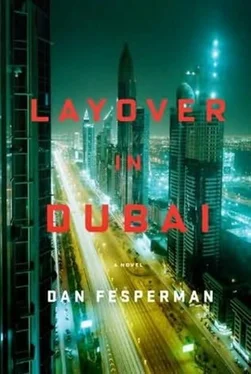“If I need anything more…”
“No, no, Keller.”
“Just as a hypothetical.”
Plevy paused, still calculating. “What kind of hypothetical?”
“I don’t know. Someone I could send up a flare to, if all else fails.”
“If you have to, shoot a message to my personal address. Better still, send it to my sister’s. Hold on, I’ll get it.”
Plevy returned a few seconds later and spelled out an AOL e-mail address.
“Put my name in the subject line, she’ll know not to look. Which means she’ll look anyway, so be as vague as possible.”
Like brother, like sister, Sam supposed.
“Thanks, Plevy.”
“Don’t says thanks. I was no help at all, officially and otherwise. Unless you turn out to be right, of course.”
Ansen’s password worked fine. The first thing he found was Nanette’s corporate bio.
She had been with Pfluger Klaxon for four years, having come to the job after six years with the Bureau of Diplomatic Security of the U.S. Foreign Service. Before that she had spent two years as a risk-assessment manager with Intermax, a global security consultant, right after graduating with honors from Brown.
Sam checked her Foreign Service postings. The first one was to Paris. The second was far more interesting: three years in Moscow.
The corporate bio was predictably glowing. Three particular programs were cited. The most intriguing was a 2007 project in Dubai in which Pfluger Klaxon, “in close cooperation with customs officials and local police,” had financed the formation of a special squad at the port of Jebel Ali to ferret out the shipments of counterfeits. Probably when she met Lieutenant Assad, just as Sharaf had guessed.
Sam scrolled back through archived press releases until he found the retirement notice for her predecessor. It mentioned that a search had commenced for his replacement, and a boilerplate job description noted, “Pfluger Klaxon’s chief of corporate security is a vice presidential position subject to an internal audit every four years by an outside consultant, reporting to the Chairman of the Board. Additionally, the vice president for security must file quarterly reports to the audit committee of the Board, with copies to the corporate legal officer, ethics officer, and audit officer.”
The audit officer was Sam’s boss, Gary Grimshaw. If Gary was lax enough to leave departmental passwords up on his screen, then a smooth operator like Plevy could probably easily find Gary’s copies of Nanette’s most recent quarterly reports.
Sam called up his personal account on Gmail and dashed off a message to the AOL address for Plevy’s sister, keeping it as vague as possible:
“Need N’s last five quarterly reports, copies filed to G.”
That would cover her time on the Jebel Ali project. He pecked around awhile longer on the off chance the audits were available online, but to no avail.
He then searched a State Department Web site for the U.S. Embassy in Moscow. Press releases were archived for the previous six years, long enough to include Nanette’s last two years on the job. Three stood out.
The first was an announcement of a meritorious honor award Nanette had won for “sustained excellence as a whistle-blower in identifying fraud and waste.” There were no specifics, but Sam knew from his own experience that this brand of “excellence” more often resulted in embarrassment than advancement. Sure enough, six months later she showed up in a press release outlining changes among the embassy’s Bureau of Diplomatic Security staff, when she was reassigned from investigations to consular affairs. Probably no pay cut involved, but her status and responsibility were certainly diminished. It made Sam recall a remark she’d made the other night. Even while she was taking pains to entrap him on the bogus sex charge, she hadn’t been able to resist an offhand complaint about her occasional lack of support from the board of directors. He wondered if being thwarted by higher-ups was a recurring theme in her role as a security cop. If so, resentment might have compelled her to take a few liberties of her own.
The third press release, toward the end of her tenure, was the most intriguing. It was an announcement of an import-export seminar for visiting American executives, organized by commercial attaché Hal Liffey. Five Russian companies had pitched in as local sponsors. One was RusSiberian Metals and Investment, the firm that was now providing business cover in Dubai for crime boss Anatoly Rybakov. The press release helpfully instructed anyone interested in participating to contact staff security officer Nanette Weaver, who was handling visa questions and security clearances. So there they were, comrades in commerce for the betterment of East-West relations. And now here they were in Dubai, perhaps continuing their fruitful cooperation. But to what end?
He checked the Web site for the U.S. Embassy in the United Arab Emirates and found a thumbnail bio of Liffey. His photo showed him smiling in front of an American flag. Liffey had been posted to the UAE two years ago. His previous postings overlapped with Nanette’s in Paris and Moscow. A long, productive friendship, no doubt.
All of it was promising, but it proved nothing. His last order of business on the desktop was to erase his Internet footprints from Laleh’s computer. Then he went looking for his wallet and passport. He searched the house room by room-every drawer, closet, and box, plus the pockets of Sharaf’s shirts, jackets, trousers, and kandouras , which were hanging all in a row like choir robes. An hour later, still unsuccessful, he even tried the refrigerator, unwrapping foil parcels in the freezer just to make sure. No luck.
He searched Laleh’s room last, then logged back onto her computer just long enough to check his Gmail account, on the off chance that Plevy had already sent a message. No luck there, either.
Sam then went to the kitchen, poured a tall glass of water and downed it at the sink while pondering where to look next. Perhaps Sharaf had taken the items with him. Glancing out the back window, he spotted another possibility-a storage shed at the rear of the carport.
Just then the phone rang, loud and jarring in the silence of the empty kitchen. He stared at the receiver, debating whether to pick it up. He supposed it could be Sharaf with new marching orders. But if someone in New York had already traced the phone call, it could also be Nanette, or the police, trying to verify his location.
He swallowed the last of the water and headed out the door while the phone continued to ring. Outside it was sunny and the temperature was already in the mid-eighties.
The shed was locked, so he circled to the back, where a small mullioned window offered a view into a dim chamber. As his eyes adjusted to the darkness he saw that it was mostly a repository for gardening equipment and discarded household items such as an old television. Then he saw a corrugated aluminum tub, filled with water. Were those his trousers, for God’s sake? They were. His shirt was there, too, sopping wet, and if his passport and wallet were still in his pants pockets, they also would be sodden.
Now what was the point of this outrage, other than sheer maliciousness? His first instinct was to smash in a pane, unlock the window, and climb in. But he didn’t want to risk cutting himself, so he ran back to the house, his anger building, and grabbed the damp blue towel from the floor of Laleh’s bathroom. He returned to the rear of the shed, balled up his fist inside the towel, and took aim at the pane just above the window lock.
That’s when he heard the cars come roaring up the drive. He lowered his fist and peeped around the corner. Blue bubble lights flashed atop a police cruiser, followed closely by the same black BMW SUV that Assad had driven into the desert. Doors opened on the cruiser and four cops in khaki uniforms piled out. Two headed for the front door of the house, and two for the back. A fifth shouted orders from the driver’s seat. The door of the BMW opened, and Lieutenant Assad stepped into the drive, hands on his hips as he watched the search unfold.
Читать дальше












